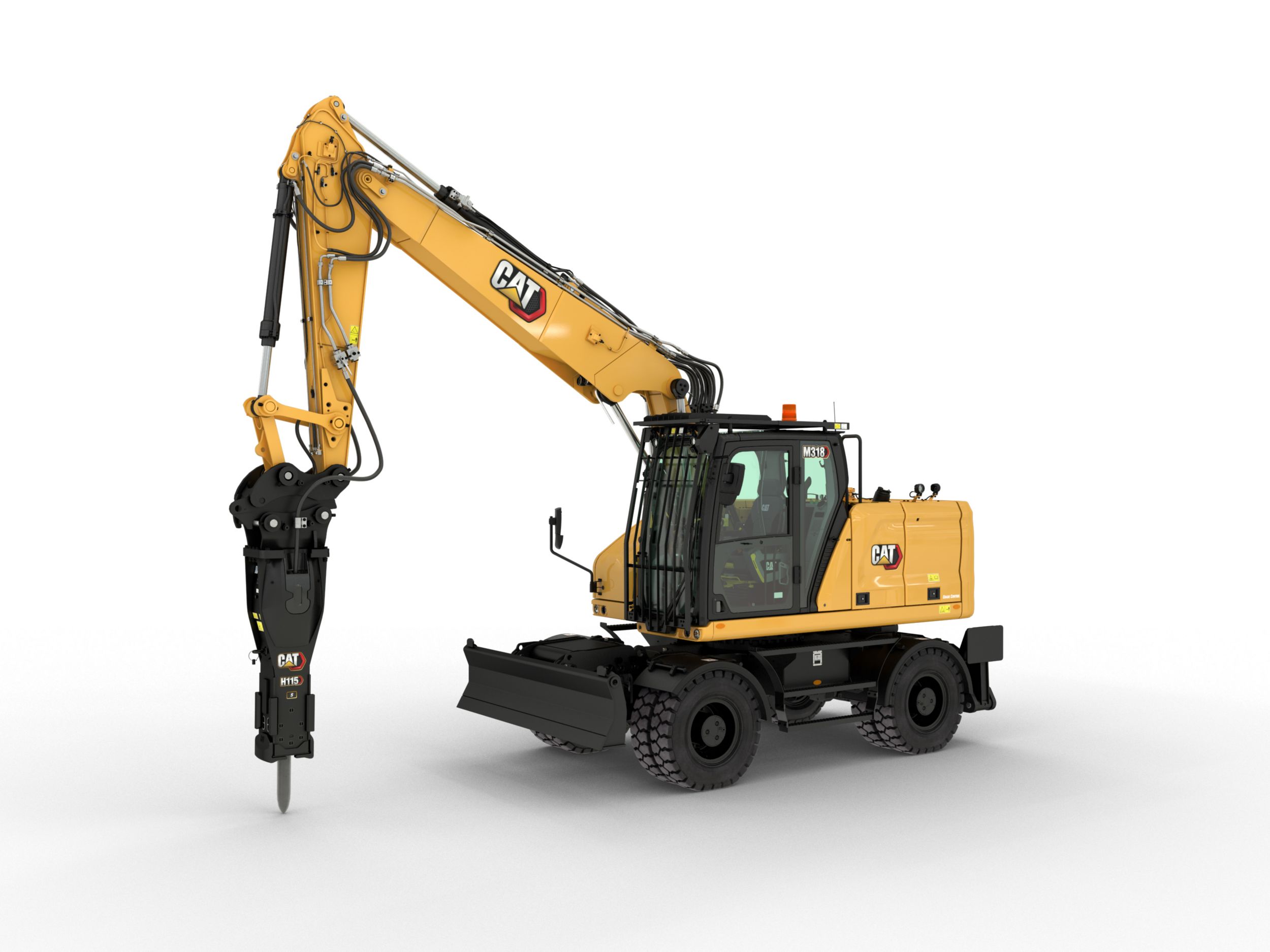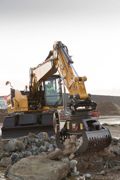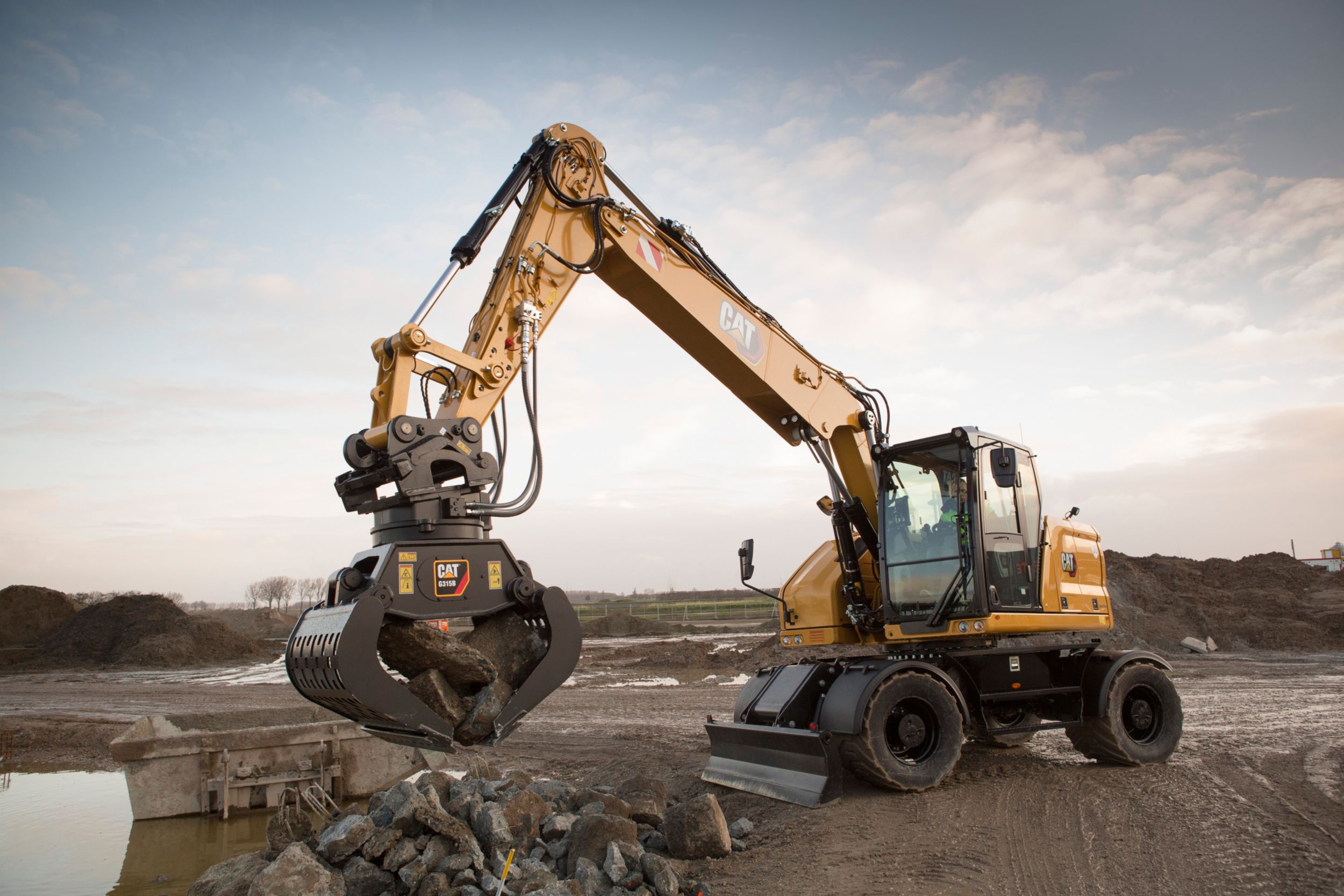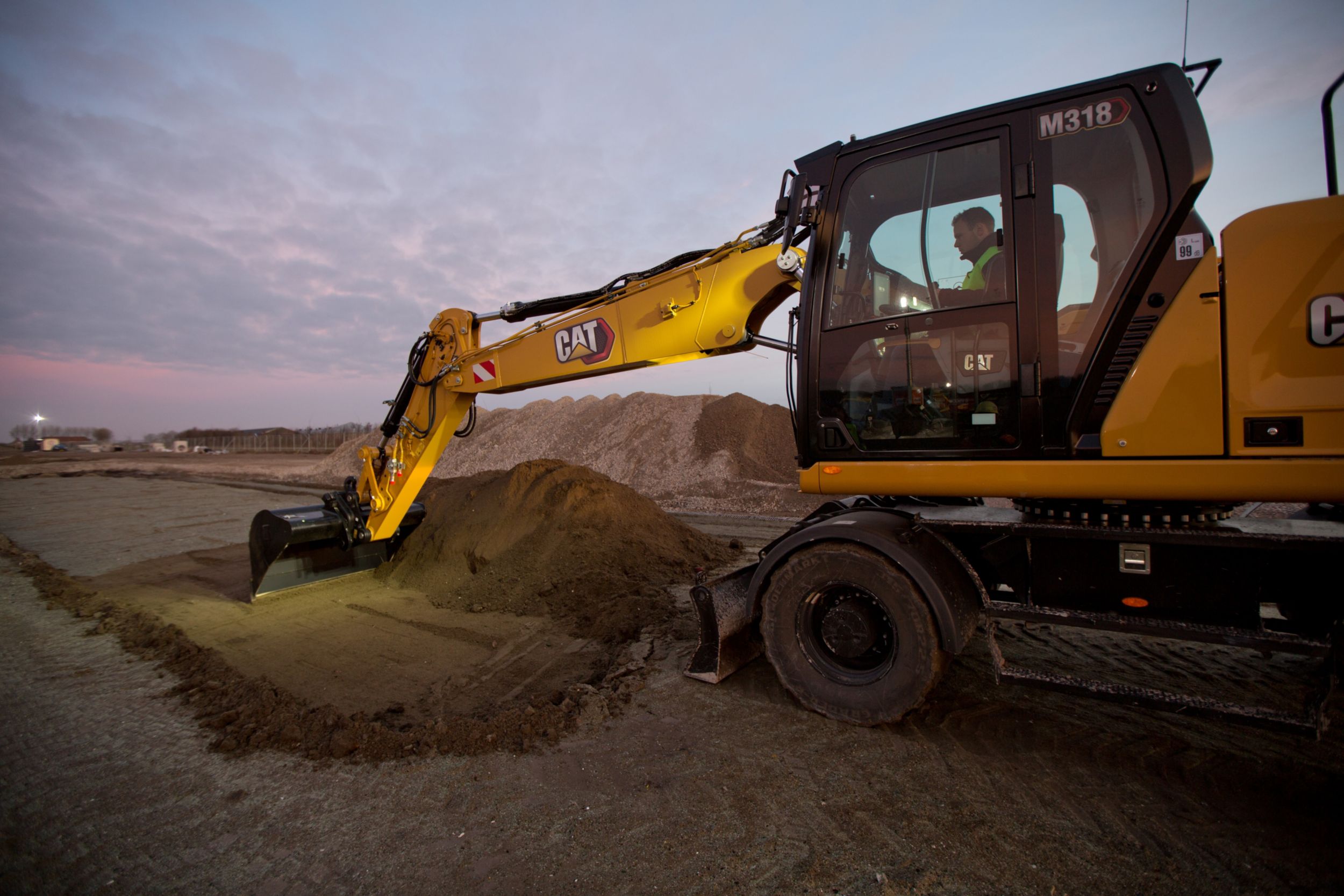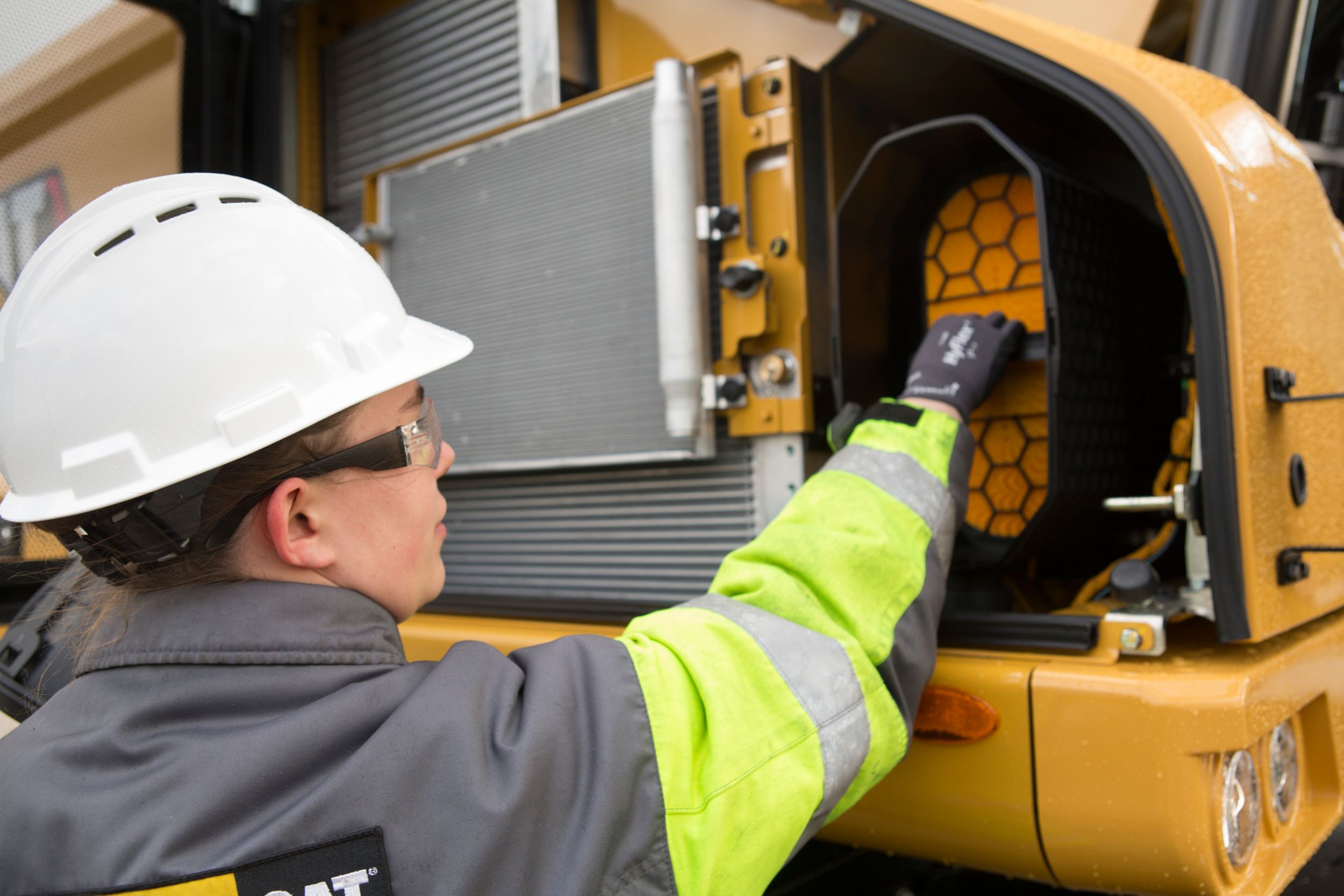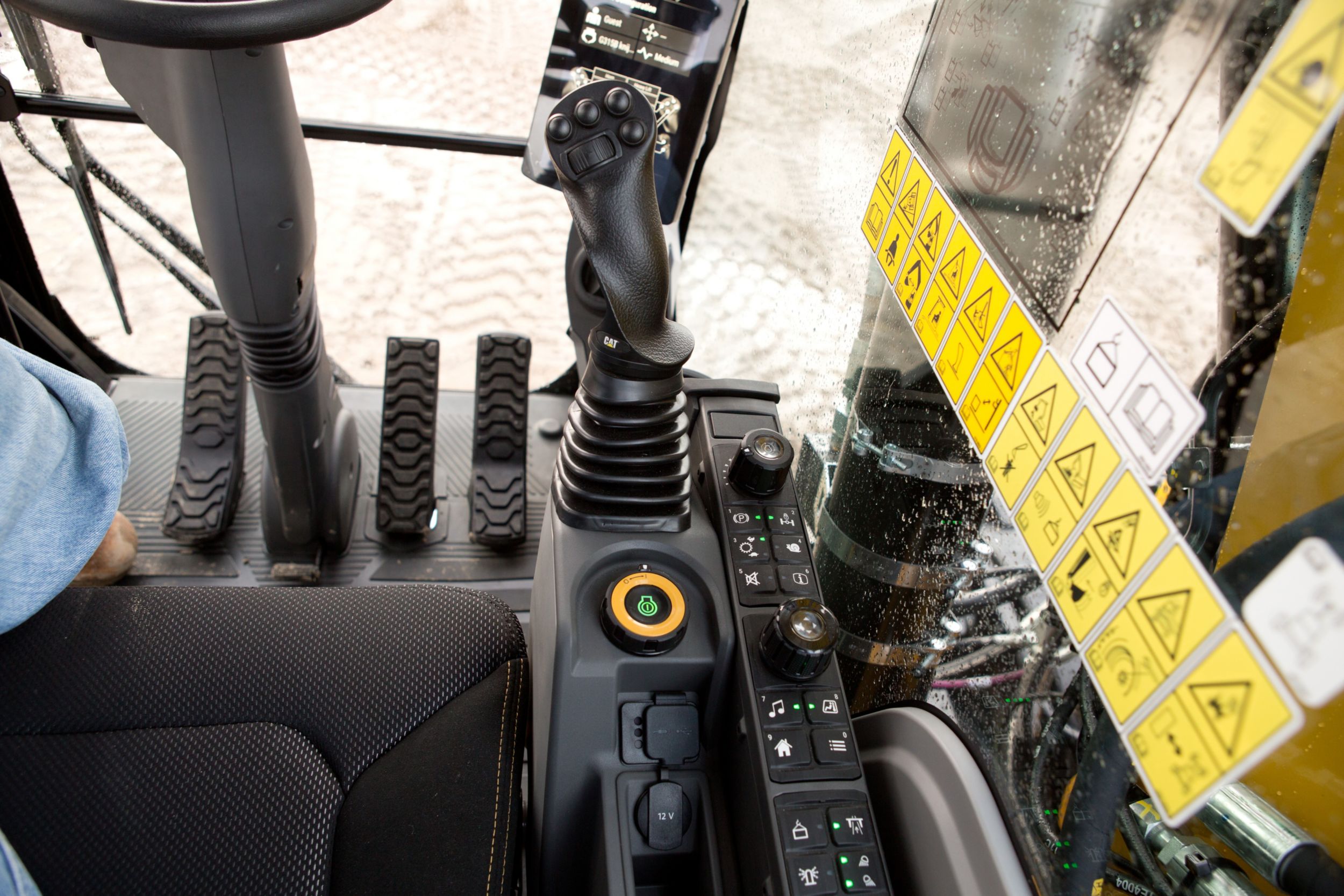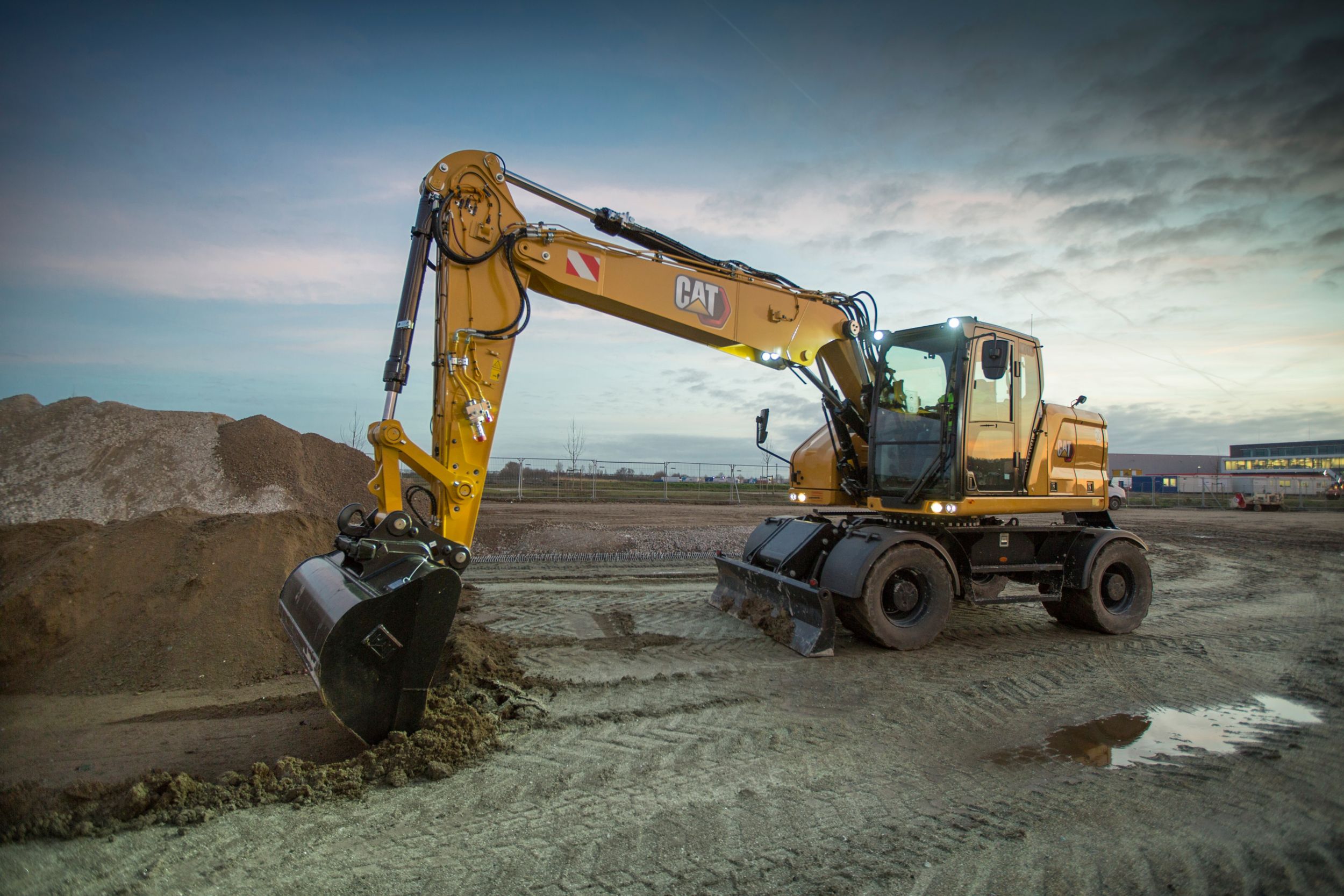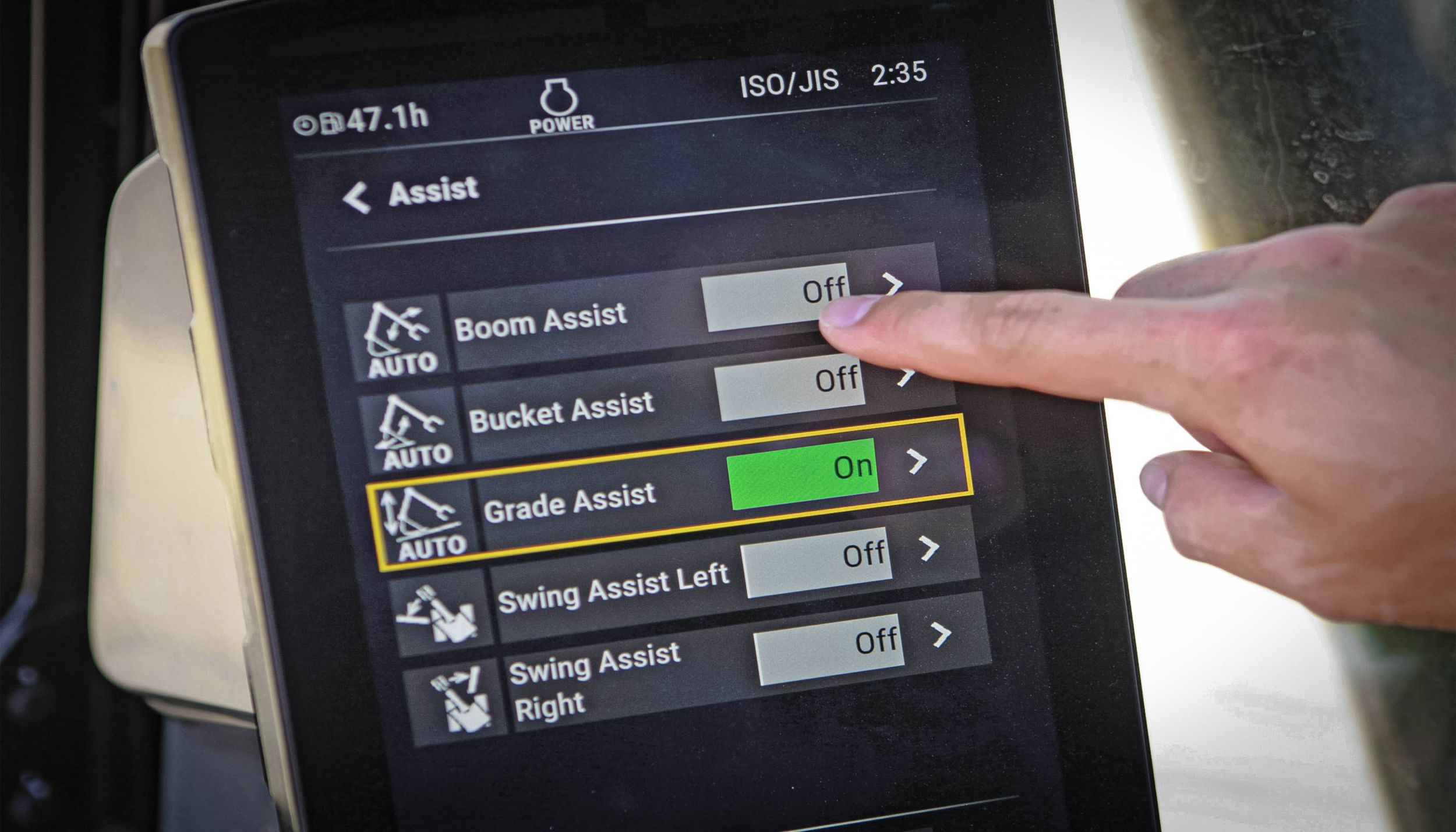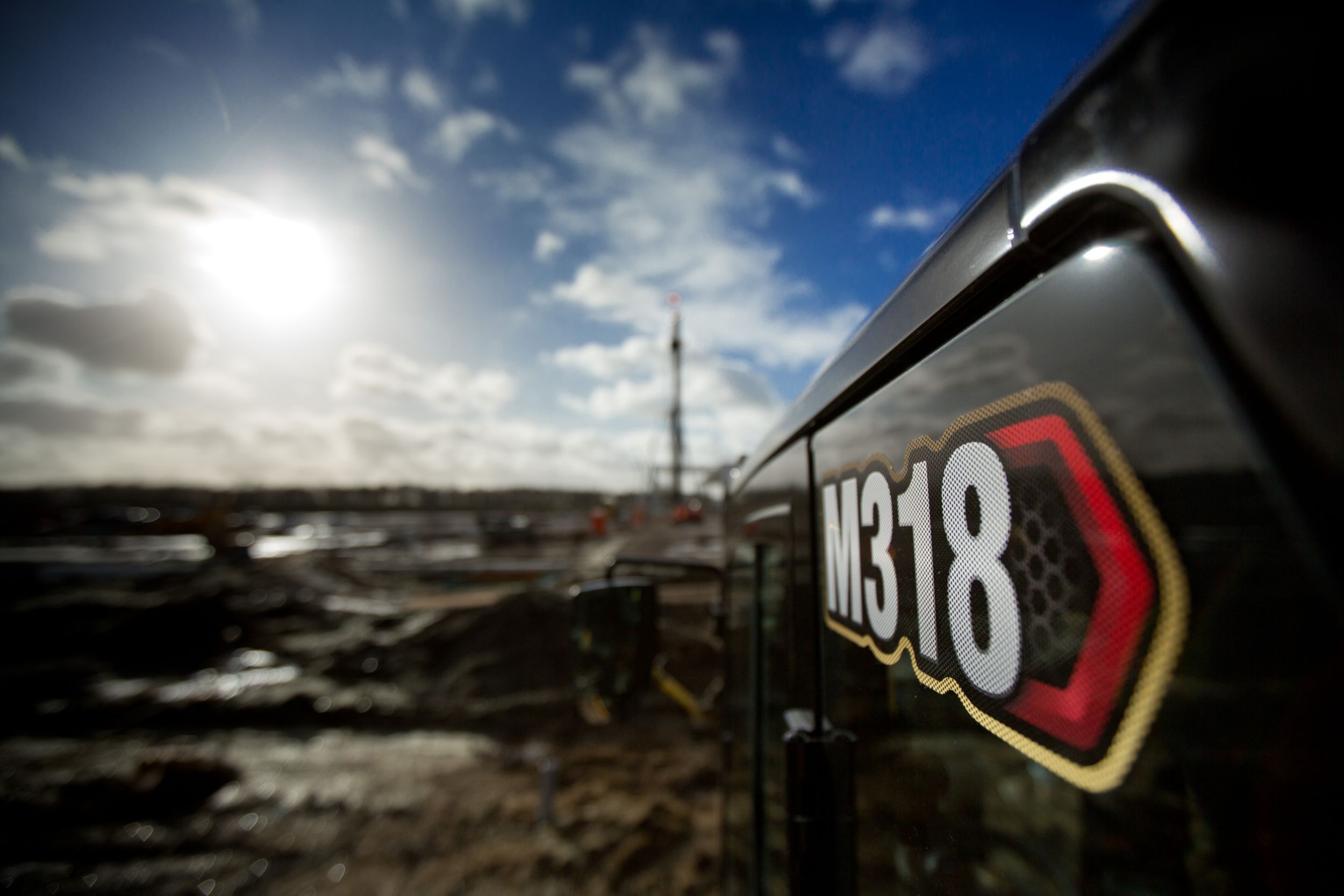Overview
The Cat® M318 Wheeled Excavator provides top performance with 14 percent more swing torque and features unmatched versatility with full tiltrotator integration and advanced hydraulics. Save time and money with up to 10 percent overall savings in maintenance costs, longer service intervals, and 100 percent daily ground level maintenance. The M318 gives you the power to work longer while keeping money in your pocket.
Specifications
Units:
| Engine Power - ISO 14396:2002 | — |
| Operating Weight Maximum | — |
| Maximum Travel Speed | — |
Benefits & Features
LATEST FEATURES
- Cab Monitor Improvements
- Continuously improved user interface allows for intuitive navigation, minimizing performance interruption with the easy-to-use touchscreen menu.
- Identify apps quickly with a grid list view, abbreviated app names, and categorized menu options.
- A new notification center keeps important information visible to the operator, and displays messages without shrinking the camera view.
- Color coded notifications set critical messages apart from the rest.
- Use the in-monitor QR code to learn about machine and technology features through a full suite of “how-to” videos.
- Enhance visibility to make service work easier and safer with optional inspection lighting.
- Standard integrated vehicle health management system alerts the operator with service guidance and parts needed to enhance uptime.
Build Number: 07D
HIGH PERFORMANCE WITH LOWER FUEL CONSUMPTION
- The Cat engine matches to your performance and production needs. The engine meets U.S. EPA Tier 4 Final, EU Stage V, and Korea Tier 4 Final emission standards.
- Travel between sites easier with travel speeds up to 35 kph (21.7 mph).
- From dirt to asphalt, the excavator matches your needs to get the job done in a timely, efficient manner.
- The advanced hydraulic system provides the optimum balance of power and efficiency, while giving you the control you need for precise working requirements.
- With up to 14 percent more swing torque, you can get the job done faster to move on to the next one. The dedicated swing pump provides consistent power for better multitasking capabilities.
- Auxiliary hydraulic options give you the versatility to use a wide range of Cat attachments.
- Don't let the temperature stop you from working. The excavator has a standard high-ambient temperature capability of 52° C (125° F) and cold start capability of -18° C (0° F).
WORK IN COMFORT
- Choose between Deluxe and Premium cab options.
- The Deluxe seat is heated and air adjustable, while the Premium seat is heated, cooled, and adjusts automatically.
- Get in and out of the cab easier using the tip-up left console.
- Feel more comfortable in the cab while you work with reduced cab vibrations from advanced viscous mounts.
- Control the excavator comfortably with easy-to-reach controls.
- Stow your gear with plenty of in-cab storage beneath and behind the seat, overhead, and in the consoles. A cup holder, bottle holder, and coat hook are also provided.
- Bluetooth® integrated radio allows for seamless mobile phone connection to listen to music, podcasts, and hands-free calling.
- Easily adjust to your ideal temperature with the touchscreen monitor or jog dial.
July 8, 2025
Specifications
Units:
| Engine Power - ISO 14396:2002 | — |
| Engine Power - ISO 14396 (DIN) | — |
| Engine Model | C4.4 |
| Net Power - ISO 9249 | — |
| Net Power - ISO 9249 (DIN) | — |
| Bore | — |
| Displacement | — |
| Stroke | — |
| Biodiesel Capability | Up to B20¹ |
| Emissions | Meets U.S. EPA Tier 4 Final, EU Stage V, Japan 2014 emission standards. |
| Note (1) | Net power advertised is the power available at the flywheel when the engine is equipped with fan, air cleaner, CEM exhaust gas aftertreatment, alternator, and cooling fan with engine speed at 2,200 rpm. Advertised power is tested per the specified standard in effect at the time of manufacture. |
| Note (2) | ¹Cat diesel engines are required to use ULSD (ultra-low sulfur diesel fuel with 15 ppm of sulfur or less) or ULSD blended with the following lower-carbon intensity fuels** up to: 20% biodiesel FAME (fatty acid methyl ester)* or 100% renewable diesel, HVO (hydrotreated vegetable oil) and GTL (gas-to-liquid) fuels.Refer to guidelines for successful application. Please consult your Cat dealer or “Caterpillar Machine Fluids Recommendations“ (SEBU6250) for details. * Engines with no aftertreatment devices can use higher blends, up to 100% biodiesel (for use of blends higher than 20% biodiesel, consult your Cat dealer).** Tailpipe greenhouse gas emissions from lower-carbon intensity fuels are essentially the same as traditional fuels. |
| Main System - Maximum Flow - Implement | — |
| Maximum Pressure - Equipment | — |
| Maximum Pressure - Swing | — |
| Maximum Pressure - Travel | — |
| Operating Weight Maximum | — |
| Operating Weight Minimum | — |
| Note (1) | Operating weight includes full fuel tank, operator, bucket 610 kg (1,340 lb), and dual pneumatic tires. Weight varies depending on configuration. |
| Note (2) | Typical configurations include 2500 mm (8'2") medium stick and 3700 kg (8,157 lb) counterweight. |
| Cooling System | — |
| Diesel Exhaust Fluid (DEF) | — |
| Hydraulic System - Including Tank | — |
| Hydraulic Tank | — |
| Final Drive | — |
| Fuel Tank | — |
| Engine Oil | — |
| Boom | 5205 mm (17'1") |
| Bucket | 0.91 m³ GD (1.19 yd³) |
| Stick | 2.5 m (8' 2") |
| Shipping Height - Top of Cab | — |
| Shipping Length | — |
| Counterweight Clearance | — |
| Ground Clearance | — |
| Support Point | — |
| Tail Swing Radius | — |
| Wheel Base | — |
| Boom Type | VA Boom |
| Bucket | 0.91 m³ GD (1.19 yd³) |
| Digging Height | — |
| Stick | 2.5 m (8' 2") |
| Reach at Ground Level | — |
| Vertical Wall Digging Depth | — |
| Note (1) | Range values are with dual pneumatic tires (10.00-20). Range values are calculated with a GD bucket (CW) and CW-30 quick coupler with a tip radius of 1484 mm (4'10"). Force values are calculated with heavy lift on, a GD bucket (pin-on), and a tip radius of 1378 mm (4'6"). |
| Bucket Forces (ISO) | — |
| Stick Forces (ISO) | — |
| Cutting Height | — |
| Maximum Swing Speed | — |
| Swing Speed | — |
| Maximum Travel Speed | — |
| Note | The air conditioning system on this machine contains the fluorinated greenhouse gas refrigerant R134a (Global Warming Potential = 1430). The system contains 0.85 kg of refrigerant which has a CO2 equivalent of 1.216 metric tonnes. |
| Recyclability | 92% |
Benefits & Features
LATEST FEATURES
- Cab Monitor Improvements
- Continuously improved user interface allows for intuitive navigation, minimizing performance interruption with the easy-to-use touchscreen menu.
- Identify apps quickly with a grid list view, abbreviated app names, and categorized menu options.
- A new notification center keeps important information visible to the operator, and displays messages without shrinking the camera view.
- Color coded notifications set critical messages apart from the rest.
- Use the in-monitor QR code to learn about machine and technology features through a full suite of “how-to” videos.
- Enhance visibility to make service work easier and safer with optional inspection lighting.
- Standard integrated vehicle health management system alerts the operator with service guidance and parts needed to enhance uptime.
Build Number: 07D
HIGH PERFORMANCE WITH LOWER FUEL CONSUMPTION
- The Cat engine matches to your performance and production needs. The engine meets U.S. EPA Tier 4 Final, EU Stage V, and Korea Tier 4 Final emission standards.
- Travel between sites easier with travel speeds up to 35 kph (21.7 mph).
- From dirt to asphalt, the excavator matches your needs to get the job done in a timely, efficient manner.
- The advanced hydraulic system provides the optimum balance of power and efficiency, while giving you the control you need for precise working requirements.
- With up to 14 percent more swing torque, you can get the job done faster to move on to the next one. The dedicated swing pump provides consistent power for better multitasking capabilities.
- Auxiliary hydraulic options give you the versatility to use a wide range of Cat attachments.
- Don't let the temperature stop you from working. The excavator has a standard high-ambient temperature capability of 52° C (125° F) and cold start capability of -18° C (0° F).
WORK IN COMFORT
- Choose between Deluxe and Premium cab options.
- The Deluxe seat is heated and air adjustable, while the Premium seat is heated, cooled, and adjusts automatically.
- Get in and out of the cab easier using the tip-up left console.
- Feel more comfortable in the cab while you work with reduced cab vibrations from advanced viscous mounts.
- Control the excavator comfortably with easy-to-reach controls.
- Stow your gear with plenty of in-cab storage beneath and behind the seat, overhead, and in the consoles. A cup holder, bottle holder, and coat hook are also provided.
- Bluetooth® integrated radio allows for seamless mobile phone connection to listen to music, podcasts, and hands-free calling.
- Easily adjust to your ideal temperature with the touchscreen monitor or jog dial.
LOWER MAINTENANCE COSTS
- Quickly check and service your machine with daily maintenance points accessible from ground level.
- Check the engine oil level quickly and safely from the ground.
- Save up to 10 percent in maintenance parts with longer lasting filters.
- Track your machine's filter life and maintenance intervals on the in-cab monitor.
- Two levels of fuel filtration protect the engine from dirty diesel.
- The hydraulic oil filter provides improved filtration performance, anti-drain valves to keep oil clean when the filter is replaced, and longer life with a 3,000-hour replacement interval - 50 percent longer than previous filter designs.
- Scheduled Oil Sampling (S·O·SSM) ports are located at ground level, simplifying maintenance and allowing for quick, easy extraction of fluid samples for analysis.
- Boost productivity with proactive service reminders. The Integrated vehicle health management system alerts the operator with step-by-step service guidance along with parts needed so you don't experience any unnecessary downtime.
SIMPLE TO OPERATE
- Start the engine with the push-to-start button, a Bluetooth key fob, or the unique operator ID function.
- Program your power mode and joystick preferences using operator ID; the excavator remembers your settings each time you go to work.
- Navigate quickly on the standard high-resolution 254 mm (10 in) touchscreen monitor or with the aid of the jog dial control.
- Not sure how a function works or how to maintain the excavator? Simply access the operator's manual on the touchscreen monitor.
- The axle locks at zero speed and unlocks when the travel pedal is activated. The axle can also be manually locked with a button on the right-hand console.
- Tiltrotator attachments--ours or other brands--work seamlessly with Cat 2D Grade, Assist, Payload, and E-Fence . With no additional hardware required, all you have to do is simply select "Third Party Tiltrotator System Installation" in the monitor, do the calibration, and get to work.
- Cat continues to improve user interface functionality for operators of all skill levels. The touchscreen monitor is an easy-to-use operating tool that presents the jobsite dashboard with an intuitive format. Productivity applications are displayed in grid-view to read on-the-go, and touchscreen navigation is programmed to make sure job performance continues without any hold ups.
Safety
- Access daily maintenance points from ground level.
- Keep your excavator secure with operator ID. Use your PIN code on the monitor to enable the push-button starting feature.
- The standard ROPS cab meets ISO 12117-2:2008 requirements.
- Enjoy better visibility into trenches, in each swing direction and behind you, with the help of smaller cab pillars, larger windows, and a flat engine hood design. Rearview and sideview cameras are standard.
- The service platform design provides easy, safe, and quick access to the upper service platform; the service platform steps use antiskid punch plate to prevent slipping.
- The standard hydraulic lockout lever isolates all hydraulic and travel functions in the lowered position.
- Travel and swing lock prevent front linkage from moving as you travel.
- Ground level shutoff switch stops all fuel to the engine when activated and shuts down the machine.
- Make service work easier and safer with optional inspection lighting. With the flip of a switch, lights will illuminate the engine, pump, battery, and radiator compartments to enhance visibility.
Boost Efficiency and Productivity with Integrated Cat Technologies
- Boost productivity versus traditional grading with optional Cat Grade with 2D system.
- Optional Cat Payload helps you achieve precise load targets to improve your operating efficiency. Pick up a load of material--with a bucket and thumb combination or grapple and clamshell attachments--and get a real-time weight estimate without swinging.
- Combine Payload with VisionLink® and remotely manage your production targets or take payload data with you.
- Upgrade to our dual antenna GNSS for maximum grading efficiency. The system lets you create and edit designs on the touchscreen monitor while you’re on the job, or you can have the plan design sent to the excavator to make your work easier. Plus, you get added benefits of avoidance zones, cut and fill mapping, lane guidance, and augmented reality along with advanced positioning capability.
- Optional Grade Assist helps you stay on grade – simply and effortlessly – with single-lever digging. Set your desired bucket angle and let Bucket Assist automatically maintain the angle in sloping, leveling, fine grading, and trenching applications
- Optional 2D E-fence is integrated right out of the factory to prevent the excavator from moving outside operator defined set points.
- All Cat Grade systems are compatible with radios and base stations from Trimble, Topcon, and Leica. Already invested in a grade infrastructure? You can install grade systems from Trimble, Topcon, and Leica onto the machine.
SUSTAINABILITY
- The Cat® C4.4 engine meets U.S. EPA Tier 4 Final, EU Stage V, and Korea Tier 5 emission standards.
- The M318 emits up to 10% less CO2 than the M318F.*
- Cat diesel engines are required to use ULSD (ultra-low sulfur diesel fuel with 15 ppm of sulfur or less) or ULSD blended with the following lower-carbon intensity fuels*** up to: 20% biodiesel FAME (fatty acid methyl ester)** or 100% renewable diesel, HVO (hydrotreated vegetable oil) and GTL (gas-to-liquid) fuels.Refer to guidelines for successful application. Please consult your Cat dealer or "Caterpillar Machine Fluids Recommendations" (SEBU6250) for details.
- Match the excavator to the job using power modes including ECO mode that reduces engine speed and hydraulic power for applications not requiring full hydraulic power - helping you to save fuel and greenhouse gas emissions.
- Cat Grade technologies combine advanced guidance with optional automated machine control helping you reach grading targets while helping to reduce fuel burn and greenhouse gas emissions by improving efficiency, job site productivity, and accuracy.
- Cat® Payload for excavators provides on-the-go material weighing which helps reduce fuel burn by improving loading efficiency, job site productivity, and eliminating trips to the scale.
- Cat 2D E-fence keeps the front linkage within a predefined work area to avoid hazards such as traffic - not only helping keep personnel safe but also helps you avoid repairs, downtime, and costly job site fines.
- Don't waste fuel idling. Cat VisionLink® online fleet monitoring helps you manage idle time and reduce fuel burn and greenhouse gas emissions. VisionLink® displays the CO2 emissions for monitored assets, calculated by fuel type for the Runtime Fuel Burned each day in a selected date range.
- Extended maintenance intervals not only reduce downtime but can decrease the amount of fluid and filters that are replaced over the life of the machine. The hydraulic oil filter can now be replaced every 3000 hours - 50% longer than previous designs.
- Remote Flash helps to minimize downtime and maintenance time while keeping your asset running with maximum efficiency. Alerts for machine updates are sent virtually from your Cat dealer and updates can be deployed without a dealer technician needing to be onsite.
- Remote Troubleshoot helps to decrease maintenance time and keep your machine running with maximum efficiency by allowing your Cat dealer to virtually test the machine while working. Once a problem is identified, a technician can fix it the first time, saving time and money.
**Engines with no aftertreatment devices can use higher blends, up to 100% biodiesel (for use of blends higher than 20% biodiesel, consult your Cat dealer).***Tailpipe greenhouse gas emissions from lower-carbon intensity fuels are essentially the same as traditional fuels.
Data not available.
Standard Equipment
- NOTE
- Standard and optional equipment may vary. Consult your Cat dealer for details.
- CAB
- ROPS, sound suppression
- High-resolution 254 mm (10 in) LCD touchscreen monitor
- CAT TECHNOLOGY
- VisionLink
- Remote Flash
- Remote Troubleshoot
- ENGINE
- Power mode selector
- One-touch low idle with auto engine speed control
- Auto Engine Idle Shutdown
- 52° C (125° F) high-ambient cooling capacity
- Cold start capability -18° C (0° F)
- Double element air filter with integrated precleaner
- Electric priming pump
- ELECTRICAL SYSTEM
- LED lights on boom and cab
- Roading and indicator lights, front and rear
- Maintenance free batteries
- Centralized electrical disconnect switch
- HYDRAULIC SYSTEM
- Automatic swing brake
- Auto hydraulic oil warmup
- Electronic main control valve
- Boom and stick drift reduction valves
- SAFETY AND SECURITY
- Rearview and right-side view cameras
- Wide angle mirrors
- Ground level engine shutoff switch
- Anti-skid plate
- Signaling/warning horn
- Integrated vehicle health management system
- SERVICE AND MAINTENANCE
- Sampling ports for Scheduled Oil Sampling (S-O-S)
- Ground-level and platform-level engine oil dipsticks
- UNDERCARRIAGE AND STRUCTURES
- Automatic brake/axle lock
- All-wheel drive
Optional Equipment
- NOTE
- Standard and optional equipment may vary. Consult your Cat dealer for details.
- BOOM AND STICKS
- 5100 mm (16'9") One-piece boom
- 5205 mm (17'1") variable adjustable boom
- 2200 mm (7'3") stick
- 2500 mm (8'2") stick
- 2900 mm (9'6") stick
- CAB
- Deluxe cab
- Premium cab
- Auxiliary relay
- CAT TECHNOLOGY
- Cat Grade Connectivity
- Cat Grade 2D
- Cat Grade with Attachment Ready Option (ARO)
- Cat Grade 3D dual GNSS
- Laser catcher
- Grade Assist
- Cat Payload
- Cat Tilt Rotator (TRS) Integration
- ELECTRICAL SYSTEM
- LED lights on chassis (left-hand, right-hand) and counterweight
- Electrical refueling pump
- HYDRAULIC SYSTEM
- Boom/stick lowering check valves
- SmartBoom
- Ride control
- Cat TRS support
- Joystick steering
- Slider joysticks (2 types)
- Combined flow/high-pressure auxiliary circuit
- Quick coupler circuit
- SAFETY AND SECURITY
- 360° visibility
- Rotating beacon
- Inspection lighting
- SERVICE AND MAINTENANCE
- Automatic lubrication system for implement and swing system
- UNDERCARRIAGE AND STRUCTURES
- 10.00-20 16 PR, dual tires
- 315/70R22.5, no gap dual tires
- 445/70R 19.5, single tires
- 300-80-22.5 dual pneumatic, spacerless tires
- 3700 kg (8,157 lb) counterweight
- 4200 kg (9,259 lb) counterweight
